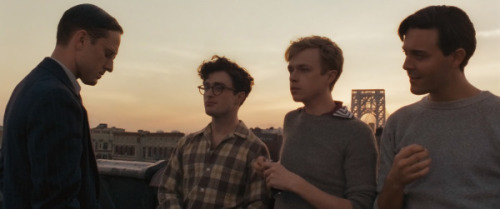LFF: Kill Your Darlings
 Thursday, October 17, 2013 at 9:00AM
Thursday, October 17, 2013 at 9:00AM Dave is at the London Film Festival, plotting how best to avoid the hoardes of Daniel Radcliffe fans who'll be coming for him soon.

In writing you must kill all your darlings."
The dilemma of how to literally take William Faulkner’s melancholy quote is the central crisis point of John Krokidas’ debut feature Kill Your Darlings. The film is a playful, confident but messy tale of Allen Ginsberg (Daniel Radcliffe) and his obsessive friendship with Lucien Carr (Dane DeHaan), a fellow student at Columbia University. Krokidas makes this relationship the heart of his film, aesthetics and narrative bound up in their complex bond, relying heavily on the two young leads who have reached this point in their careers by markedly different paths. Despite the presence of some more seasoned hands in the cast - Ben Foster, Jennifer Jason Leigh, David Cross - this is a strikingly youthful film, effectively matching the burgeoning talents it explores.
Carr’s allure and rebellion brings Ginsberg together with other members of what would become the Beat Generation: Jack Kerouac (Jack Huston) and William S. Burroughs (Ben Foster). All are implicated, when, in a twisted vision of Faulkner’s quote, Carr murders David Kammerer (Michael C. Hall), in what was judged to be an ‘honor slaying’ - a heterosexual killing a known homosexual. The misalignment between these strict definitions and the more opaque sexual desires and motivations of the characters provide much of the film’s friction, although Radcliffe’s much-discussed gay sex scene is a disappointingly tangential experience in the Ginsberg arc. Perhaps it’s because, as remains the case with Radcliffe, all aspects of feeling are filtered through his perpetual anxiety; Ginsberg’s joyful, curious discovery comes tinged with awkward facial expressions.

The reliance on those two young leads proves the film’s downfall. While DeHaan is a better actor, he’s still defining himself with an aloofness that leaves little room for Carr’s supposed charisma. Since the narrative relies on both Ginsberg’s and Kammerer’s hopeless obsession with Carr, DeHaan’s cool, detached demeanour practically derails the film. Thankfully the quadrangle cutting of the climactic scene makes it clear that the events and history of the narrative, though not arguably the film itself, are just as concerned with Burroughs and Kerouac, and their fractious talents are ably played Foster and Huston. Huston especially cuts a strong figure as Kerouac but he and Elisabeth Olsen are somewhat wasted as Kerouac’s wife since their own parallel artistic growths are barely acknowledged.
Krokidas does his best to keep the rhythms of the film fresh and interesting, but many of his unique approaches to the psychological fancies of the narrative feel too effortful. Though it's a vibrant film experience, it doesn’t quite come across without actors that can lend the techniques the life they demand. When he uses M83’s Bloc Party remix for an orchestral frenzy late in the film, it’s certifiably cool, but the bridge between period and technique never joins up. The necessary engagement with Beat clichés should be tempered by the psychological intrigue of the narrative, but the characters just never match that darling status.



Reader Comments (5)
I haven't seen this yet but I liked ON THE ROAD and it's weird to me that this one is getting so much more attention. But then I'm not a Radcliffe fan so perhaps that's why it's odd to me.
I agree with basically all of this (and as I'm currently trying to write my review it has come in handy!) My main problem was though that for a film that so repeatedly tells us how revolutionary and out of the box Ginsberg was, the film is really traditional and staid.
The Huston and Foster casting sounds great.
I am puzzled by the title being attributed to a quote by William Faulkner. I always thought it was by Jessica Mitford, the journalist. I can see it being much quoted and in common circulation, but I thought it was her description of writing.
"as remains the case with Radcliffe, all aspects of feeling are filtered through his perpetual anxiety; Ginsberg’s joyful, curious discovery comes tinged with awkward facial expressions."
I've wondered what bothers me about Daniel Radcliffe's acting, because sometimes he shows promise. You nailed it. It feels like anxiety coming from the actor. Maybe that's why his facial expressions are often awkward or feel false.
The film was disjointed and stale, but Ben Foster, Jack Huston, and Michael C. Hall delivered like pros.
I have long wanted to revisit the chronicles of the London Film Festival, found a book review example, now I will be happy to do this.